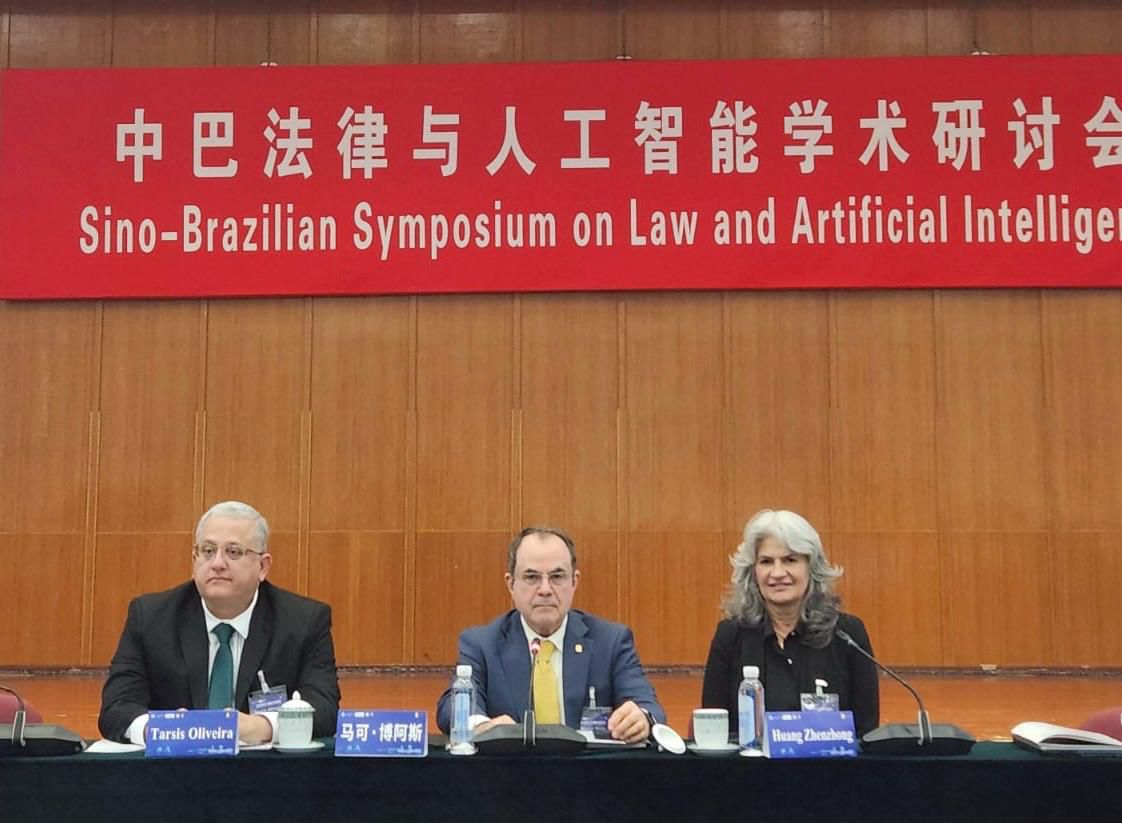
A delegation of 38 magistrates from different Brazilian states is participating in the Sino-Brazilian Academic Seminar on Law and Artificial Intelligence, held on Tuesday (October 14th) in the Yingdong Hall of Beijing Normal University. The activity is part of the programming of the international course on Global Connections: Law, Innovation, and Artificial Intelligence, promoted by the Permanent College of Directors of State Schools of the Magistracy (Copedem), in partnership with the Superior School of the Judges of the State of Tocantins (Esmat) and with the support of the Federal University of the state of Tocantins (UFT).
The course, led and coordinated by Justice Marco Villas Boas, president of Copedem and general director of Esmat, marks an academic partnership between Brazil and China focused on discussing the legal, ethical, and social impacts of AI, promoting the exchange of experiences and the development of innovative solutions for the Justice System.
Under the academic coordination of Professor Tarsis Barreto, the course was accredited by the National School for the Training and Improvement of Magistrates (Enfam), reaffirming the institutional commitment to the continuing education of magistrates and civil servers, in line with national guidelines for judicial education and technological innovation.
The Seminar agenda is organized into four thematic areas:
- Use of AI in the Judiciary
- Genealogy of Applications and Practical Tests
- Regulation
- Assessment of AI Reliability in the Justice System
During the opening ceremony, Justice Marco Villas Boas, emphasized that artificial intelligence is already reshaping the effectiveness of the Judiciary.
"Our priority is double: to accelerate innovation and protect fundamental rights. Integrity, transparency, explainability, and data protection are not incidental items—they are non-negotiable foundations of digital transformation in judicial schools and courts," he said.
Educational cooperation and scientific diplomacy
According to Professor Liang Yuxiu, Dean of the Law School at Beijing Normal University, the main objective of the partnership is to train talented individuals with an international view and the ability to engage in intercultural dialogue.
“Sino-Brazilian cooperation is also an effort to build mutual trust and global digital governance," he pointed out.
One of the highlights of this collaboration is the Ponte (Bridge) Project, which trains young people to be bilingual in Chinese and Portuguese to work in areas of legal and technological cooperation between the two countries. The initiative is directly linked to the expansion of educational diplomacy, driven by memoranda of understanding signed in 2024.
Lectures and Contributions
In the first session, Villas Boas presented the Multiresponse Dialogic Method (DMR), which uses prompt engineering frameworks to stimulate multiple possible legal responses—a tool inspired by the Theory of Law as Integrity of Ronald Dworkin. The method seeks to avoid outsourcing the judicial function, allowing for traceability and explainability of decisions, based on thoughtful thinking (System 2 of Daniel Kahneman), minimizing biases and inequalities of treatment.
In the same session, executive director of Esmat, Ana Beatriz de Oliveira Pretto, presented the investments made in the implementation of the Interdisciplinary Laboratory of Artificial Intelligence (LIIARES), the first laboratory of its kind in a Brazilian School of the Judges, focused on the digital transformation of the Judiciary of the state of Tocantins.
Chinese authorities also shared experiences from the Internet Court of Beijing, highlighting the use of AI in trials.
“Collaboration with Chinese universities was a strategy to raise standards of quality, safety, and ethics. We seek reliable AI without giving up public control, due process, and the guarantee of fundamental rights”, Villas Boas emphasized.
”We are establishing operational bases for joint projects, researcher exchanges, and new training initiatives”, added the magistrate.
Thematic panels
In the second session, Wang Qinghua, professor at the Beijing Normal University (BNU) Law School, addressed the regulation of “platform power.” Professors from USP (University of the state of São Paulo) Ana Carla Bliacherine and Luciano Vieira de Araújo presented Brazilian experiences with algorithmic justice.
Prosecutor Zhuang Xiaoqian, from the Public Prosecution of Chaoyang, shared practices already adopted in China, such as the use of AI to organize documents, analyze evidence, and support decisions in criminal cases involving foreigners.
In the third session, Professor Jiang Ge, from Tsinghua University, discussed the regulatory challenges of AI and the concept of “human intellectual achievement” in the age of algorithms. Professor Wu Shenkuo, from Beijing Normal University, presented the Chinese position on global AI governance.
Brazilian participation
The seminar also featured contributions from Brazilian professors working in judicial training and interdisciplinary research:
- Liziane Paixão (UniCEUB (University Center of the city of Brasília)/UNIT (Tiradentes University)/ESMAT (Superior School of the Judges of the State of Tocantins-UFT (Federal University of the state of Tocantins)) analyzed the legal framework for AI in Brazil;
- Ângela Issa Haonat, Justice of the TJTO (Court of Justice of the State of Tocantins) and deputy director of Esmat (Superior School of the Judges of the State of Tocantins), addressed accountability, governance, and privacy;
- Humberto Xavier de Araújo, Professor of UFT (Federal University of the state of Tocantins), discussed the use of AI and the Internet of Things in the Justice System;
- Tarsis Barreto, professor at UFT (Federal University of the state of Tocantins)/UNITINS (State University of Tocantins) and coordinator of the Graduate Program in Judicial Provision and Human Rights (ESMAT/UFT), reflected on the limits of AI in criminal law.
Chinese researchers concluded the debates by discussing data sovereignty, algorithmic transparency, and fintech regulation, focusing on the Chinese legal model on “data property rights” and its regulatory implications.




